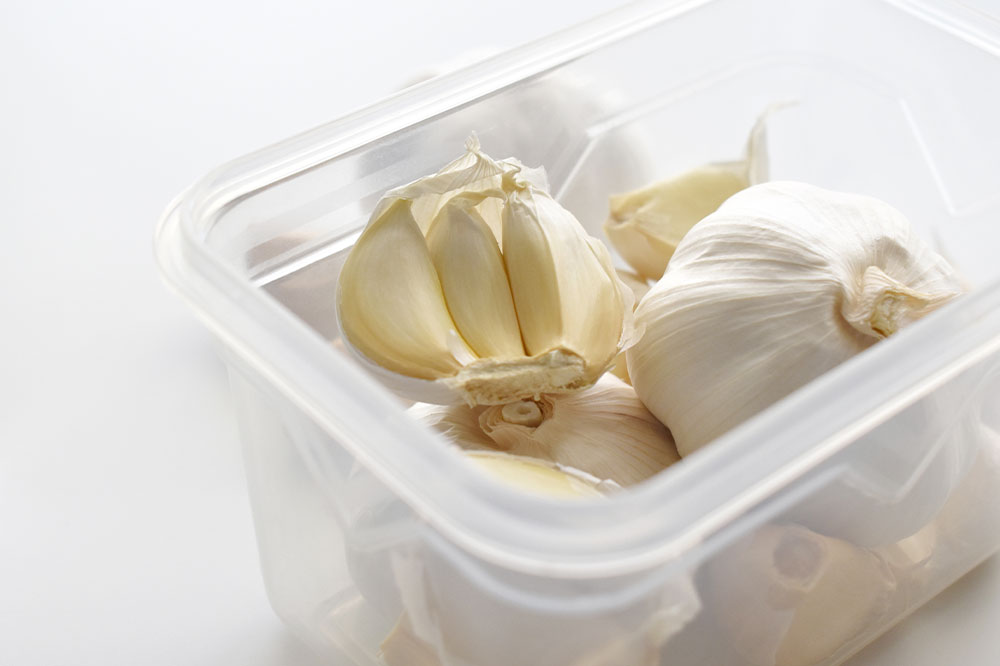Ultimate Guide to Storing and Preserving Garlic
Garlic is a tasty and adaptable ingredient in many different cuisines worldwide. However, garlic can be difficult to store, as it spoils quickly if improper storage practices are not followed. This article will shed light on how to store garlic and keep it as fresh and flavorful as possible. These suggestions will enable you to keep garlic fresh and use it in your favorite dishes. You can store a large quantity or just a few cloves.

How to store garlic
Garlic can be kept in various ways, but the most important thing is to keep it dry and away from moisture, light, and heat. Here is your answer to how to store garlic:
- Keep garlic bulbs in a cold, dry place: You should keep them in a pantry or kitchen cabinet since they need to be kept dry and cool. They can sprout or rot if they are kept in regions that are exposed to heat or sunshine.
- Store it in a well-ventilated container: Garlic should be kept in a vented container to avoid mold growth or rotting. Examples of such containers include mesh bags or wire baskets. This will keep the garlic dry and allow air to circulate around it.
- Do not store in the fridge: Garlic shouldn’t be kept in the refrigerator because doing so can make it sprout and lose its flavor. It can also develop mold in the frigid and humid atmosphere of the fridge.
- Store peeled or chopped garlic in oil: Peeled or sliced garlic can be kept in oil for later use. Place the garlic in a jar with some olive oil; this will preserve the garlic’s freshness and impart garlic flavor to the oil.
- Freeze garlic: Garlic can also be frozen. Garlic bulbs can be frozen intact, or the cloves can be chopped and frozen in a resealable bag. Garlic that has been frozen can be used in recipes without having to thaw it first because it keeps for several months.
These suggestions will help you preserve garlic correctly so that it lasts as long as possible while being fresh and fragrant.
Benefits of preserving garlic
Garlic can be preserved for several reasons. The following are some benefits of preserving garlic:
- Longer shelf life: Although garlic has a relatively short shelf life, you can increase it and stop it from rotting too rapidly by properly storing it.
- Convenience: Cooking can be easier if you choose to preserve garlic in several forms, such as peeled cloves, chopped garlic, or minced garlic. If you frequently cook with garlic, this can save you time and effort.
- Enhanced flavor: Pickling or preserving peeled garlic in oil are two techniques that can improve garlic flavor. Your dishes may taste better as a result of the new depth of flavor this might provide.
- Nutritional advantages : Garlic has several health advantages, including strengthening the immune system, lessening inflammation, and enhancing cardiovascular health. You can take advantage of these benefits of preserving garlic all year long and making adding garlic to your meal plan simpler by storing it.
In conclusion, freezing garlic can be a terrific way to enjoy its flavor and health benefits while making it easier to use in cooking. It is a versatile food, and preserving garlic can be done in several ways, including freezing, storing in oil, and pickling.
Benefits of eating garlic
Due to its distinct flavor and perfume, garlic is common in many cuisines worldwide. But in addition to its culinary use, garlic has many health advantages. The following are some potential benefits of eating garlic:
- Boosts immune system: Garlic’s antiviral and antibacterial properties can aid in boosting immunity and defending the body against diseases and infections.
- Reduces inflammation: The anti-inflammatory compounds found in garlic may help lessen inflammation and lower the risk of developing chronic diseases like arthritis and heart disease.
- Lowers blood pressure: Garlic has been shown to lower blood pressure, which may help lessen the risk of heart disease and stroke.
- Improves cholesterol levels: It reduces LDL (the bad cholesterol) and raises HDL (the good cholesterol) levels; according to studies, garlic may help lower cholesterol levels.
- Reduce chances of cancer: Garlic may be able to fight cancer, according to detailed research, especially when it comes to lowering the risk of certain cancers, including stomach and colon cancer.
- Enhances digestion: Prebiotic fibers found in garlic can improve digestion and encourage the development of good gut flora.
In general, there are many benefits of eating garlic. Including garlic in your meal plan may benefit your health and well-being. However, it’s crucial to remember that garlic shouldn’t be used in place of medical care, and you should always speak with your doctor before making any significant changes to your meal plans or lifestyle.
You can preserve its flavor and health advantages when properly stored while extending its shelf life. For example, you can use several techniques to preserve garlic, including freezing, storing it in oil, and pickling, making it easier to use in your cuisine. Follow the suggestions above on how to store garlic; you can make sure that your garlic stays tasty and fresh to use in all your favorite recipes.


